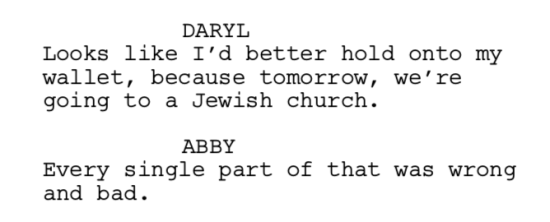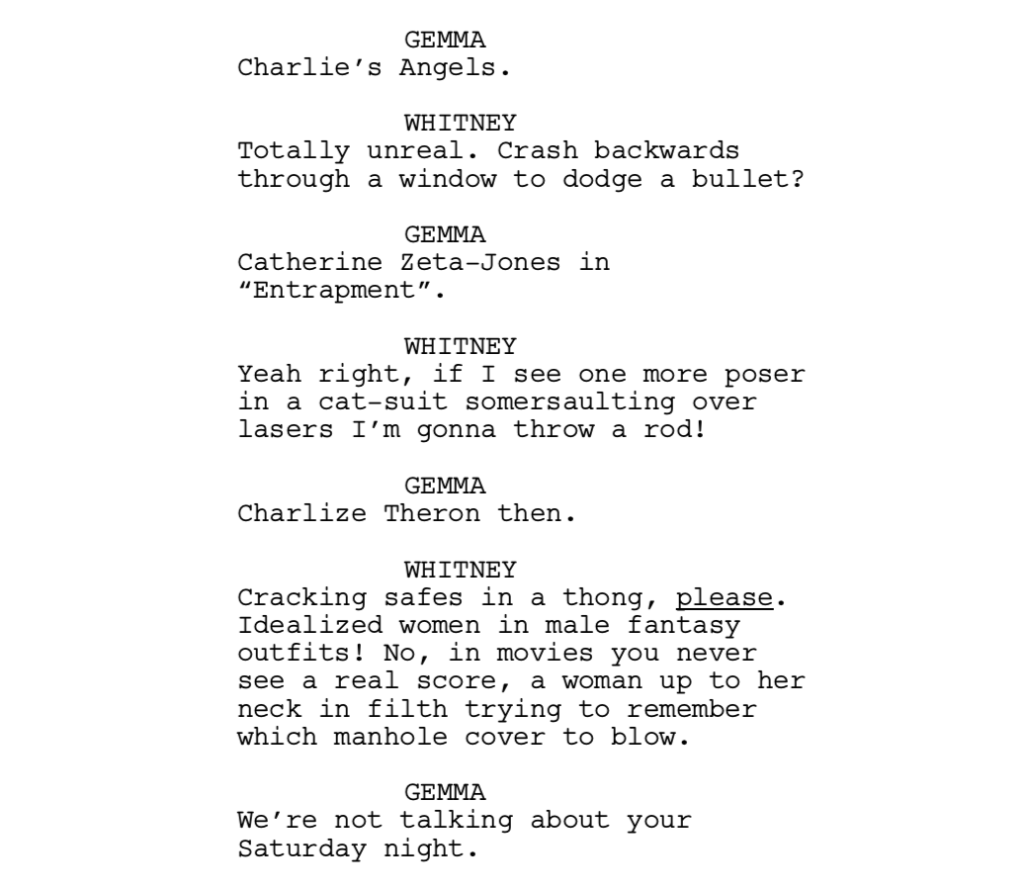Search Results for: F word
Genre: Comedy
Logline: (from Hit List) Abby hosts a popular true crime podcast about a brash blue collar troublemaker named Daryl, who she believes was wrongfully convicted of murder. But when Daryl breaks out of prison and shows up at her apartment, she goes from podcaster to accomplice as the unlikely pair team up to try to exonerate him before he’s caught.
About: I picked this script from the 2018 Hit List when I saw that the writers had sold another script called “Haunted Haunted House.” I thought that was hilarious. The writers started their career writing for College Humor, where they won numerous Emmys, and most recently wrote for Last Week with John Oliver. This film is set to star Awkwafina as the podcaster and Ike Barinholtz as the escaped convict.
Writers: Dan Gurewitch & David Young
Details: 110 pages
Let’s start today’s review with a Scriptshadow PSA. Your comedy spec should be between 100-110 pages. If you are outside this page count window, your screenplay will be terminated by the Scriptshadow Incinipager 11,000. Thank you for listening. Have a nice day.
You may be asking why I’ve yet again ventured into comedy territory with today’s script. The last time I gave a good review to a comedy was back in the 70s with Smokey and the Bandit. Ah, it feels like yesterday when Burt Reynolds signed up for the role of Smokey off the buzz from my script review. Or was it the Bandit? Who’s keeping track? All I know is that if you want something in this world, you have to will it into existence. I want to laugh during a screenplay again. And so it shall be!
Ultra liberal Abby Parrish had it all – the number one podcast in the world, fans hanging on her every word, late night talk shows touting the addictive nature of Crime after Crime. Every week, Abby would delve deeper into the murder of Tom Hutcherson, a simple man who was stabbed 17 times behind a bar and left for dead.
Earlier that night, everyone saw Tom fighting with his dimwitted overweight law-breaking brother, Daryl. So it must have been him who murdered Tom! That’s what the courts said. But Abby ripped open every crevice of the case to prove that Tom was innocent. Except she never proved anything either way, leaving a rabid fanbase to turn on her for wasting dozens of hours of their lives.
Lucky for Abby, she’s getting a shot to finally put the nail in the coffin. Or… take.. the nail out of the coffin? When there’s a blackout at the local prison, Darryl, in all his white-trash glory, figures he should make a run for it. He, of course, runs straight to Abby’s, just as she’s about to have sex for the first time in 3 years. The uptight Abby is NOT cool with Darryl crashing her sex party. But then she realizes she can finally give her audience what they’re looking for – an ending.
She agrees to help Darryl find out who really killed his brother and they figure the best course of action is to steal Tom’s phone from police evidence and see who he was calling that night. After successfully pulling the phone heist off, they find a bunch of calls placed to Temple Beth Israel Synagogue, which is strange because Tom was Catholic. They go there and talk to a shifty guy named Spencer, who says that, “Oh yeah, he used to do landscaping work for us.” It’s all a bit shady but when they look deeper into Spencer, he checks out.
Next up is Darryl’s ex-girlfriend’s new boyfriend, Gene, as Darryl has concocted a theory whereby Gene has been planning for years to steal Darryl’s girlfriend and figured out the best way to do it was to kill Tom and frame Darryl for it! Abby doesn’t go with him on this one so Darryl kidnaps Gene himself, disguising himself and using a voice modulator to interrogate him.
Meanwhile, Abby finds the murder weapon in Darryl’s favorite secret hiding space, confirming her deepest fears – that Darryl did it. When she confronts Darryl about this, he falls apart, devastated that she wouldn’t believe him. Feeling bad, Abby decides to follow one more lead, a hail mary tied to that Spencer guy at the synagogue. If it pays off, justice will prevail. If not, she’ll have to come to grips with the fact that she’s been fighting for a murderer.
So here’s the thing with comedies today. They really only come in two forms. Female-driven and technology-driven. Even though that Anne Hathaway Rebel Wilson comedy just bombed, that’s the stuff they’re looking for. I don’t know why you would keep betting on a bad horse but sometimes Hollywood doesn’t make sense.
The other comedies that still shine are technology focused. That Uber comedy that’s coming out soon – that sold not long after Uber become popular. Here, we have a spec about true crime podcasts. What’s the common denominator? They allow you to write movies that haven’t been written before. And comedy is the genre that best takes advantage of pop culture and modern living.
Netflix is sort of changing the game. It seems like they want to bring high concept comedy back sometimes (“When We First Met”), but then they go out and make something like, Always Be My Maybe which doesn’t have a hook at all. I think they’re still trying to figure out what type of movies work for them. So we’ll have to stay tuned on the streaming front.
Back to Crime After Crime.
One of the ways I judge comedies (outside of the obvious – that I’m laughing) is how writers deal with familiar situations. Familiar situations are where newbie writers bare all their newbieness. I can tab a newbie the second we get to a familiar situation and they take all of the predictable routes. Seasoned writers find a new wrinkle, twist, or spin on a familiar situation.
One of the first familiar situations to come up in Crime after Crime is the cops visit Abby’s place immediately after Darryl escapes prison, forcing Darryl to run into Abby’s bedroom and hide. What’s more familiar than a character needing to hide in a bedroom? We’ve seen it a million times. So I’m going to have you actually practice this lesson yourself. What is your new comedic twist on this “need to hide in a bedroom” scene? Because I know what’s going to happen here. When I reveal what these writers do, you’re going to say, “Oh! That’s not funny Carson! You’re dumb for laughing!” Okay, so put your money where your mouth is. Go down to the comments and write what your funny twist would be, and we’ll let everyone else decide if your idea is funnier than these guys.
Are you back? Okay, so here’s what Gurewitch and Young did. Darryl runs into the bedroom, checks under the bed, but it’s filled with stuff. He runs to the closet, but it’s packed. He can hear the cops coming so he looks around, and he sees on the bed… a body pillow. He quickly unzips the body pillow, throws the insides out the window, then squeezes in and zips it up, trying to stay as still as possible. When one of the cops spots the body pillow, he confesses that he’s thinking of getting one and would it be okay to cuddle with it to see how it feels. Abby must think on her feet to prevent this from happening, and somehow get the cops out without realizing the body pillow is Darryl. If you wrote something funnier than that down in the comments, you get five Scriptshadow stars.
These guys know what they’re doing. They don’t always hit. You never do in comedy. But they knew how to construct scenes that are both clever and funny. One of the things I tell you to do is that everything should be hard for your hero. For example, it’s easy in investigation scripts to have a bunch of straight-forward scenes in rooms with heroes questioning leads. But that’s not very clever. And it doesn’t lead to much comedy, unless you’re a dialogue comedy ninja.
In one of my favorite scenes, this paranoid lead will only talk to Abby at a death metal concert because he knows that way he can’t be recorded. So when Abby gets there, he’s right in the middle of the mosh pit, and Abby must go into this wild crazy limbs-swinging mass of dirt and blood and violence to get information from this guy. That’s how you make things tough for your hero! And it’s certainly more fun than talking in someone’s apartment.
The only problem I had with this script is that the pairing of Abby and Darryl wasn’t that interesting. The two were on different sides of the political aisle. But that was never explored. There was no sexual chemistry either, so it lacked conflict on that front. As different as we’re told these two are, they get along well, and that lack of contrast made for some boring interactions.
Still, there were enough laughs to keep the read entertaining. And while this one isn’t going on anyone’s OMG, THAT WAS HILARIOUS list, it’s a fun way to spend 90 minutes.
[ ] What the hell did I just read?
[] wasn’t for me
[x] worth the read
[ ] impressive
[ ] genius
What I learned: A lot of people are afraid of comedy these days because every little minor joke is being interpreted as hateful. But unlike stand up, where the person themselves is delivering the potentially inciting joke, in scripts, you can have characters say risky funny things as long as it’s in character. Audiences are more accepting of this because the characters are fictional. Here, Darryl and Abby have just found out that Tom has ties to the synagogue. Their quick interaction…
Genre: Drama/Light Sci-Fi
Premise: Two life-long friends, one married, one single, find joy in playing their favorite fighting video game together, Striking Vipers. But when the latest version of the game becomes too realistic, the friends find themselves exploring it in unexpected ways.
About: Black Mirror is back, this time with only a 3-episode season, likely because they spent a big part of their budget on the Black Mirror feature, Bandersnatch. This episode has a strange development history to it. It was originally about a corporate VR exercise where team-members would enter a VR simulation to stage a musical – the key idea being that inside the simulation nobody knew who was who. It just goes to show that your original idea isn’t set in stone and that if another storyline starts to show promise, you should follow it.
Writer: Charlie Brooker
Details: 1 hour long
I still contend that Charlie Brooker has the best gig in the world. Even if you compare him to the titans of the industry – Steven Spielberg, James Cameron, JJ Abrams, the Russo Brothers – all of those guys have to fight like mad for three years to get movies through the slog of a system known as Hollywood, with a gaggle of corporate types breathing down their necks the whole time. I was watching a Russo Brothers interview after they finished filming Endgame and they looked like they were on the verge of passing out. They were mumbling incoherently, confused about what they could and could not say, and genuinely seemed over it.
Meanwhile, Charlie Brooker gets to write and make these experimental mini-movies, knowing that the second he finishes writing them, he can start shooting. Imagine a world where you come up with an idea, spend a couple of months writing it, then immediately afterwards, shoot it? That’s the world Charlie Booker exists in. And sure, the immediacy of that formula results in some misses. But because he’s so talented, it far more often results in hits. Which leads us to today’s script, a futuristic update of Brokeback Mountain.
For those who haven’t seen the brilliantly directed episode, it follows Danny, a married father of one who looks about as happy in his marriage as I do at the dentist. Technically, Danny is living the dream. His wife is gorgeous. He’s got a house with a killer view. His backyard parties look like the stuff of Hollywood commercials.
Meanwhile, Danny’s best friend of 15 years, Karl, chose the opposite path in life, enjoying being a single man, dating as many beautiful girls as possible, and killing it at work. The thing that has always bonded these two men together is the video game Striking Vipers, which is an unofficial stand-in for Street Fighter. During one of Danny’s parties, Karl gives him the latest version of Striking Vipers, a Matrix-like update where you literally become the character you’re fighting as.
In their first remote game (the two are each at their respective homes playing online) Danny chooses to play as his favorite character, the Bruce Lee-like “Lance,” and Karl chooses the buxom Asian blond, Roxette. But something funny happens during the fight. Roxette kisses Lance! Lance goes along with it, but it becomes too weird for Danny, who cancels out of the game. A few days later, Karl pops up online again, the two briefly chat, confirming to each other that the last game was a mistake, only to jump into the game, and this time have sex!
Danny finds himself looking for every opportunity to slip away from his family and play Striking Vipers with Karl, but eventually his wife senses that his focus is elsewhere, forcing Danny to decide what he’s gonna do about both relationships. He figures that he and Karl must meet in person and kiss to see if this is just a ‘game’ thing or a ‘real life’ thing. His whole life hangs in the balance of this kiss. What will happen?
First of all, I loved this episode. It’s one of the best Black Mirror episodes I’ve seen. Even better, it brings up an extremely important screenwriting talking point, something it’s imperative every screenwriter understand.
When you come to Scriptshadow, the formula you always hear about is GSU – Goal, Stakes, Urgency. The most important component of those three is definitely the first one – GOAL. Your main character having a goal will be the primary driving force of the story. The reason for this is simple. If your character is going after something, he’s going to bring the story with him.
However, not every story is goal driven. And this is particularly true in television, because in a season of 8, 10, and sometimes 22 episodes, it’s hard to always give your character a goal. So there’s something else that TV uses. And it’s called “The Dramatic Question,” which amounts to a question at the beginning of the episode that the audience will stick around for to get the answer to. In the case of Striking Vipers, the dramatic question is: “Will these two end up together?”
The problem with the Dramatic Question format is that it’s too loose. It’s easy for a writer to convince themselves that they’ve come up with a question that the audience finds worthy. For example, I’ve read lots of coming-of-age scripts over the years that have had no character goals and when I asked the writer why it was he thought the reader would want to read to the end, his answer was some version of, “They’re going to want to know what happens to my character.”
Let me make something clear: “Will my character’s life turn out okay?” is not a good enough dramatic question to build a story around. It’s too vague. And this is the problem with the Dramatic Question format. It provides too much leniency in its framework. Luckily, I have a way for you to fix that. When it comes to the Dramatic Question, there’s one change you need to make, and if you do it well, your Dramatic Question episode, or even movie, will work.
You change “Stakes,” to “STAKES.” In other words, in a Dramatic Question narrative, the stakes need to be sky-high. Look no further than Striking Vipers to see how this is done. The stakes are EXTREME. Danny has a wife, a home, a kid. If this relationship with Karl goes beyond the game, he could lose all of that.
I would go so far as to say if you’re more interested in television than you are in features, you have to master the Dramatic Question narrative. Cause a lot of times, the only thing to do in an episode will be character-driven (as opposed to plot driven). So you’ll want to lay down an important dramatic question at the beginning of the episode.
Also, Dramatic Question narratives are MUCH HARDER to do in features. They can be done, of course. But a big reason this episode works (in addition to other TV episodes) is that the answer to the question comes within an hour. Once you try stretching that into two hours, boredom sets in. The stakes need to be EVEN HIGHER. The character work needs to be EVEN BETTER. As much as I liked this episode of Striking Vipers, there’s no way it would’ve worked as a feature.
All you Dramatic Question Feature Junkies – you’ve been warned.
I’ve seen some reviews online saying this batch of Black Mirror episodes wasn’t that good. I’ve only seen the first two episodes but so far, they’re some of the best episodes in the series. Haters gonna hate! Scriptshadow gonna like.
[ ] What the hell did I just read?
[ ] wasn’t for me
[ ] worth the read
[x] impressive
[ ] genius
What I learned: High stakes are imperative when you don’t have a strong character goal or narrative urgency. Just to drive this point home, imagine this story if Danny is single, just like Karl. The entire episode collapses. Sure, you still have two guys struggling with their sexuality. But that struggle isn’t disrupting anything. Giving Danny so much to lose is what makes the answer to this dramatic question – Will these two end up together? – so compelling.
What I learned 2: The more general and unfocused the dramatic question in your Dramatic Question narrative is, the less interesting your story will be. For example, the most generic of generic questions is, “What’s going to happen?” Yet there are bad writers everywhere who think that as long as there’s some semblance of this question driving their narrative, readers will be captivated. It takes more than that. Focus in on exactly what your question is, keep the stakes high, and your Dramatic Question episode or feature should be in good shape.
Today I want to share with you something I never figured out while I was writing screenplays. This was such a game-changing revelation that had somebody told it to me early on in my journey – as opposed to 15 screenplays in – I’d be writing this entry from the set of a 200 million dollar Disney production as opposed to a couch that has about a dozen uses left in it. I’m talking about understanding what a movie is actually about.
When I started writing, I was under the impression that movies were about the idea. So, in other words, if I came up with an idea about an asteroid that was heading towards earth, I thought my movie was about an asteroid heading towards earth. And you may be thinking, after reading that sentence, that the movie IS about an asteroid heading towards earth. But you’d be wrong. What I’d eventually come to realize is that the prototypical movie idea is only your first act. That’s where you showcase your concept. You have someone discover the asteroid. You have leaders deliberate what to do about the asteroid. You have the planet get wind of the asteroid. You have everybody freaking out. But guess what? That only takes you to page 25.
One of the Matrix moments for me was realizing the movie isn’t about the idea at all. Well, it is. That asteroid is going to be a part of the story all the way through. But the real movie is about what happens once your idea has been established and you’re into the second act. Which is ironic because that’s the act most writers are the least interested in. To them, the second act isn’t a playground to charge into excitedly. It’s a giant wasteland of space that one must “get through” in order to arrive at the more punctual and structured third act.
Let me try and say this another way because Armageddon isn’t the best example for what I’m proposing. It’s possible to have an idea but not have a movie. Let’s say your idea is to have several characters wake up in a mysterious room, each with a different tattoo on their hand and they no idea how they got there. That’s an idea. You can get a first act out of it. But what happens next? I’m sure we could come up with some plotlines. But the reality is that there’s no meat to this story, no second act. So whenever you come up with an idea, you shouldn’t worry about the first act. The first act will take care of itself. You should be thinking about what comes next. That’s going to be your movie. In the spirit of this concept, here are the five questions you should ask yourself when trying to figure out if you’ve got a full blown movie idea.
1) What does your hero do after page 25? – This will simply determine if there’s something to do in the story. And this is all tied back to the goal. Essentially, page 26 is when the journey begins. So you need a character (or characters) who are going after something. I don’t remember exactly what happens in Armageddon but I think one of the characters goes out to put the team together. Later on, the recruited characters become the drivers of the story. But as long as we’ve got someone going out and trying to accomplish something on page 26, that’s a sign you have a movie. It’s not everything. But it’s the first piece.
2) Does your hero or a main secondary character have a flaw? – Your second act isn’t always going to be “go go go.” You’re going to have slow spots, which is why the second act is so challenging. You have to know how to keep those slower moments engaging. One of the ways you do this is with a character whose internal life is at odds with the external circumstances. So to use a basic example, if a character is closed off to life and prefers to stay in his little bubble, then you want a narrative where that character is forced to do a bunch of crazy stuff. Therefore, before every scene begins, you’ve already got a compelling situation lined up. The classic example of this is Cameron in Ferris Bueller’s Day Off. He hates doing things, being out, challenging himself. And yet every scene is forcing him to do this stuff. This is really powerful when you get it right and it makes second acts a lot more entertaining.
3) Do you have at least three unresolved relationships you’re exploring? – Now we’re getting to the meat of it. This is what your movie is REALLY ABOUT. It’s about characters interacting with each other. And if those characters are getting along, watching them interact will be boring. It’s only fun when they’ve got unresolved stuff with one another. Maybe it’s unresolved problems from their past, maybe it’s a disagreement on how to do things, maybe it’s fundamentally different worldviews – whatever it is, there’s got to be conflict there. But there’s a catch to this. It can’t be surface level “follow the rules” conflict. It has to be genuine. You, the writer, must be genuinely emotionally invested in these conflicts. This is why so many famous authors will tell you to draw from real life. Because if the broken friendship between your heroes Axe and Clay is really about your own broken friendship with your former best friend, then everything you write with those characters is going to have an air of authenticity to it. But if you’re just doing it because I’m saying you have to or because William Goldman said you had to, it’s not going to work. This is the crux of this whole article, guys. It’s not about whether the ship sinks. It’s about what happens to Jack and Rose. If exploring your characters and their issues doesn’t excite you, then, I’m sorry, but your second is going to suck.
4) Is there enough journey for the journey? – Despite the fact that the real focus should be on the characters, you obviously still need plot to push the story along. And one of the most common errors writers make is getting to that second act and realizing that they don’t have as much plot as they thought they did. So what you want to do is make sure you’ve got (at least) three big things that are going to happen in the second act. If you’re writing a straight up Hero’s Journey, this should be easy. Just come up with three big places that your hero will need to get to along the way and spread those plot points out equidistantly. But if you’re writing a drama or a contained horror movie, this will be more challenging. The three things are more likely to be (although they don’t have to be) things you throw AT you characters. So, if you’re writing a contained zombie movie where our heroes are inside and a bunch of zombies outside? One of your three big moments might be a door breaking down and 10-12 zombies getting in. The bigger point here is to make sure that you’ve got enough for your characters to do. I can promise you that if you head into your second act without this figured out, you’re not going to make it to the finish line.
5) Is there a force that’s always aggravating our hero(es)? – Remember that the second act’s nickname is the “Conflict Act.” So your mind should always be on, “What can I do to provide the most conflict in my story?” The idea with this tip is to make sure you have a constant aggravating factor working against your hero at all times. The most simplistic version of this is a villain. But it can be weather. It can be time. The reason you want this figured out is that whenever you’re struggling in your second act, one of the easiest ways to get the story moving again is to pit your main aggravating force against your hero. If your bank robber heroes have robbed yet another bank on page 67 and you don’t want that scene to feel like all the other bank robbery scenes, you have your “villain” cop show up and he and the hero have a little showdown. I would go so far as to say if you don’t have a great aggravating force figured out ahead of time, you’re not ready to write your script.
If all of this sounds confusing, I’ll try and simplify it. A movie idea isn’t worth writing unless you’re excited about writing the second act. And the second act is about character and conflict. If you don’t have a passion to explore those two things, then the heart of your screenplay is going to be dead. :) Good luck!
Carson does feature screenplay consultations, TV Pilot Consultations, and logline consultations. Logline consultations go for $25 a piece or $40 for unlimited tweaking. You get a 1-10 rating, a 200-word evaluation, and a rewrite of the logline. If you’re interested in any sort of consultation package, e-mail Carsonreeves1@gmail.com with the subject line: CONSULTATION. Don’t start writing a script or sending a script out blind. Let Scriptshadow help you get it in shape first!
Genre: Comedy
Premise: A jewel thief reconnects with her sister, who’s just gotten out of prison, and the two get a team of women together to steal a bunch of diamonds at the always weird and wild Met Gala.
About: This script was sold to New Line in 2015 during the female comedy goldmine era where you could write on your first page, “Two women are introduced,” then, on the second page, “funny stuff happens for the next 99 pages,” and you’d sell the script. But hey. I’m not mad at these writers for cashing in. If Hollywood’s handing out money, by all means take it. The script was written by Gregg Rossen & Brian Sawyer, who made their mark writing Christmas TV movies.
Writers: Gregg Rossen & Brian Sawyer
Details: 111 pages
I didn’t even know what the Met Gala was until a month ago. I guess it’s a fashion event where people dress up in the most ridiculous – but FAB-ULOUS – outfits they can find. Getting on the list is next to impossible, as it’s 11k a head. Normally, this subject matter wouldn’t interest me. But I’m so desperate to read something good and the recent Black List scripts have been so bad that I had to think outside the box. I like heist movies. This isn’t the traditional setting for a heist movie. That promises at least some originality. Right?
When we meet 30 year old Whitney (we’re told to “think Anna Kendrick”), she’s giving a rich couple a chakra makeover for their apartment so that all the chi is properly aligned. But really, Whitney’s installing a pretend “energy panda” that later gets up, steals the couple’s very valuable diamond, and takes it to her. I’m not even sure what to say about that but, yeah, that’s the first scene.
Later, Whitney overhears that the Met Gala, which will be incorporating Elizabeth Taylor’s jewel collection, is going to be insuring the party for 100 million dollars. Whitney doesn’t think much of it until her wily sister, Gemma, who just got out of prison (for taking the fall for Whitney) wants to get back out there and steal stuff. When she hears about the Met Gala, she wants in.
But they need a team, so they call army girl Maya, excellent climber turned suburban mom, Melinda, and tech-girl who’s not above stealing money from churches, Kristine. I think there are a few other girls but at this point, my mind was so numb from the choice I’d made to commit to this script that I couldn’t be sure. Yeah, so they all come together, argue for awhile, and begin practicing for the big Met Gala heist.
Oh! I forgot to tell you. Whitney’s boyfriend is a cop. And he knows that she’s a thief. However, he tells her that with this particular job, he can’t look the other way. It’s too big. So even though she’s going to be pursued by her OWN BOYFRIEND, Whitney still heads off to steal 100 million dollars from the Met. And, in case you were wondering, Whitney SWEARS this is the last heist. She’s retiring after this.
You may have noticed that after I review a comedy spec, I rarely address whether the script was actually funny or not. The reason is that mileage varies with comedy. Even if I told you this script was hilarious, you might read it and think it was the unfunniest thing in history. That’s how different everyone’s taste in humor is.
But today I’m going to try. The three areas I’m looking at in comedies are — 1) Are the characters funny? 2) Is the dialogue funny? And 3) Are the situations clever? Of those three, the first one is the most important. The mistake most people make in comedy is giving us copies of characters we’ve already seen. Alan, from the Hangover, who took a lack of self-awareness to a whole new level, was a character I hadn’t seen in a comedy before. Which is a big reason why he broke out and became a classic character.
But if you really want to be a comedy writer, you have to have funny dialogue. Give me something clever like Woody Allen or Fleabag. Or give me more straightforward humor, like Superbad or South Park. Again, if all you’re giving us is a bunch of stock uninspired interactions, you shouldn’t be writing comedy. Here, the girls argue if there’s ever been a female thief to look up to for inspiration.
Finally, there are situations. And this is where, if you’re bad at the first two, you can make up some ground. All you have to do in a comedy to make people laugh is deliver on the promise of your premise. Put us in situations that we could ONLY experience in your movie. So if you’re writing The 40 Year Old Virgin, we better get some scenes where our main character has a chance to get laid and screws it up in a variety of funny ways.
Of these three areas, Met Gala Heist fails at every one. Well, maybe fails is a strong word. It doesn’t excel in any of these areas. If I gave any writer who follows this site a writing challenge where they had to write a scene with two sisters, one of whom was a planner, the other impulsive, you would all be able to write dialogue as good as this. That’s how standard the dialogue is.
And the only thing unique about this idea is the wacky dress-up that occurs at the Met Gala. If you’re going to mine your concept for unique comedy opportunities, that’s the place to do it. You could give one of the characters a giant elaborate dress where they’re able to hide all of their surveillance equipment inside. As I’m writing that, I’m realizing that it’s too broad. But you get the point. That’s where your unique comedy opportunities are. And we don’t get any of that for the first 70 pages. And once the heist starts, we only get a little of it at the Met.
So where does that leave us? Ocean’s 11 but without the IP.
In Met Gala Heist’s defense, the writers do try and create real characters here. Our main character is flawed with how obsessive she is. Her sister is flawed in how reckless she is. Their relationship is complicated because Gemma took the fall for her. So Whitney owes her. I get on comedy writers all the time for only focusing on the comedy while ignoring the characters. And these writers DID try with the characters. But the thing with comedy is it doesn’t matter unless we’re laughing. Nobody gives you points for nice characters arcs or proper structure in comedies. That stuff is only acknowledged if we’ve laughed our butts off.
I wish I could give you some clear reason why this sold. But the only thing I can come up with is that these writers probably heard from people in the industry (since they’d worked in the industry for awhile) that studios were looking for a female comedy heist, so they wrote one up quickly and – boom – sale. Sometimes it’s being in the right place at the right time.
[ ] What the hell did I just read?
[x] wasn’t for me
[ ] worth the read
[ ] impressive
[ ] genius
What I learned: X-Factor character. When you’re writing something this formulaic, it helps to throw an unpredictable element into the mix. An x-factor character is a great option. Here, we have this character, Omar, who is a diamond thief that’s always undercutting them. Showing up at their jobs, then swooping in and stealing the jewels at the last second. Because they always have to worry about this guy and never know where he is or when he’s going to appear, he adds a necessary element of unpredictably to the story.
Genre: Drama/Psychological Thriller
Premise: Based on a real life story, the psychotic father of a freshman at a small college moves into her apartment and begins controlling the lives of the 6 other coeds who live there.
About: This is a high-profile “New York” magazine article that got picked up by Hollywood heavyweights Jason Blum and Mark Wahlberg. They haven’t decided whether to turn it into a TV show or a movie yet. Though if they go the movie route, Wahlberg will play the baddie, Larry. This is pretty shocking, as Larry will be one of the most reprehensible characters ever put on screen. I guess Wahlberg is going for that Oscar. But it’ll come at a price as he’ll temporarily lose his 4th of July Middle America family hero image.
Writers: Ezra Marcs and James D. Walsh.
Details: 5000-7500 word article
If you break into this business, there’s a good chance it will be through a Jason Blumhouse production. He’s the guy who specializes in high concept low-budget fare, which is what you should be writing if you want to break in. Therefore, you should always be tracking what Blum is up to. Understanding his taste could be the difference between a writing career and a bartending gig.
Talia Ray is in her first year at liberal arts college, Sarah Lawrence, living with a group of coeds, when she informs them that her father is getting out of prison and needs a place to stay. She assures them that he had “been framed” and was a great guy. As it turns out, Talia was telling the truth. The 50 year old Larry Ray was a quirky but energetic guy who liked to tell tales about his time in the military and CIA.
At first, Larry played the part of dorm dad, laying down a schedule, paying for meals, helping the students study. But then he began holding group therapy sessions at the end of the day, all of which ended, oddly, with Larry convincing one of the students that they were sexually abused as a child.
Things got weird when Larry started sleeping in the same room as one of the students, Isabella. And when another student, Daniel, started dating Isabella, he would instruct them to have sex in front of him under the guise that he could help them achieve a higher sense of clarity (or something). Daniel thought something about Larry was off. But since everyone else in the dorm seemed to think he was great, he figured he, Daniel, must be the problem.
How Larry ended up in prison is hard to sort out because Larry’s so good at lying. Everything he claims has a sliver of truth to it so if you look into it, there’s no proof that it’s definitively a lie. For example, Larry claims to know Robert DeNiro. And Robert DeNiro does actually say he met Larry once. Most of his connections date back to knowing one of Rudy Giuliani’s right hand men, a powerful contact in the years directly after 9/11. But Larry ended up selling him out, which resulted in a revenge mission that put Larry behind bars (according to him).
Things get truly devious when we learn how Larry makes money. In one of the most bizarre schemes I’ve ever heard of, Larry tells people that they “broke” items of his, makes them admit it in written form, and forces them to pay him back. Some of these items, like a window, could go for a couple hundred bucks. But other times he claims his entire house was destroyed and demands half a million dollars. In one of the saddest examples of this guy’s insanity, one of the girls, desperate to pay him back, began working as a high class escort after she graduated. Charging $8000 an evening, all of the proceeds went to Larry.
So how do you get away with all this? As is typical with these psychopaths, they use intimidation, manipulation, and threats to keep their victims in line, and they never do anything they know can put them in prison. They don’t kill anyone. They don’t rape anyone. In every case, the victim makes the decisions. Some of these people have actually escaped Larry’s clutches, and he’s still out there hunting them down, trying to get the money he’s “owed” back. Larry denies any of this happened, of course, and says that it’s actually himself who’s the victim. That Giuliani’s old aid is trying to kill him.
This reminds me a lot of the true life podcast “Dirty John” (which would eventually be made into a TV show). But even though the titular character in that story would end up trying to murder someone, I feel like Larry is worse. This guy is pure evil in every way. He manipulates. He cons you out of money. If you try to run away, he threatens you. And if anybody calls him on it, he claims he’s the victim. He’s literally the worst type of human being you can be.
Which is our first screenwriting lesson of the day. Remember that when you’re conceiving of an idea, you’re looking for something that makes the audience FEEL SOMETHING. If they don’t feel anything, your story is a failure. Now the more popular movies like to make you feel good. Or scared. Or they might make you feel sad-happy in that cathartic “I’ll never let you go Jack” way. But one of the overlooked ways to make an audience feel is through anger.
You saw this, for example, in the documentary, Three Identical Strangers. With each new revelation, we became angrier and angrier. The reason you don’t see this used as much is because people don’t like to go to the movies to be angry. They go to the movies to escape negative emotions. So it’s a risky choice. What you’re hoping for is that the audience (or reader) gets SO riled up, that they have to talk to other people about it. And those people will then have to see it for themselves. I feel like Larry is powerful enough to achieve that.
I can also see why, out of the millions of articles on the internet, Blumhouse chose this one. You get to tell the story of a cult but the story is already localized for you. What does “localized” mean? Well, one of the challenges of writing about a big event is figuring out what you’re going to zoom in on. For example, if you’re telling a story about the apocalypse, you can’t cover every country and every city and every person and the military and the government and etc. etc. You need to find a small group of people you’re going to follow. “The Stolen Kids of Sarah Lawrence”allows you to tell a story about a cult, but it’s all happening in this tiny dorm room. It’s already localized.
On top of this, “Sarah Lawrence” has a second thread working underneath it, one that’s fascinated people for as long as cults have been around. That being, “How can they be so stupid?” A couple of the girls who come into this story graduated from Harvard and Columbia. And Larry’s got them in a three-way sexual relationship. The fact that nobody can ever satisfactorily answer that question is why cults will always be fascinating. For what it’s worth, I think falling victim to a cult is a combination of things. One, these are often people who feel lost. And when people are lost, it’s easier to spin them a tale. Second, I think being in a cult is a bit like falling for the wrong person. By that I mean someone who’s cruel to you. Someone who takes advantage of you. Someone who psychologically manipulates you. But when you’re in love, you can’t see these things. Your best friend could literally lay out all of the ways this person is terrible to you, and you can’t see what they’re saying. I imagine cults working on a similar level. At least, that’s the only way I can make sense of it.
I could see this being a good TV series. Tell the story through the kids’ point of view and focus on them wanting to get out but not being able to. Cause if you tell the story the way it’s told in this article – that nobody wanted out until the very end – it will be infuriating. We have to have one or two people trying to get away and expose this man.
[ ] What the hell did I just read?
[ ] wasn’t for me
[x] worth the read
[ ] impressive
[ ] genius
What I learned: The “Liar Liar Pants on Fire” sub-genre. Hollywood loves stories about liars. We just had a prominent Oscar contender liar with Can You Ever Forgive Me. If you can find a true-life story about a liar who got into some deep sh*t because of his lies, consider writing that puppy.









